Violence has continued today in the economic centre of Ivory Coast, the south-eastern city of Abidjan, and has left one dead after clashes between protesters and police forces began early in the morning. Today most of the businesses in the city remain paralyzed and the BBC reports that the La transmission centre of the national television was “burnt down, but is working again, even though the video is of poor quality”. Political tensions over the outcome of the presidential election past November, when the candidate from the opposition Alassane Ouattara accused Laurent Ggagbo, president since 2000, of fraud, have given way to widespread violence in most of the country.
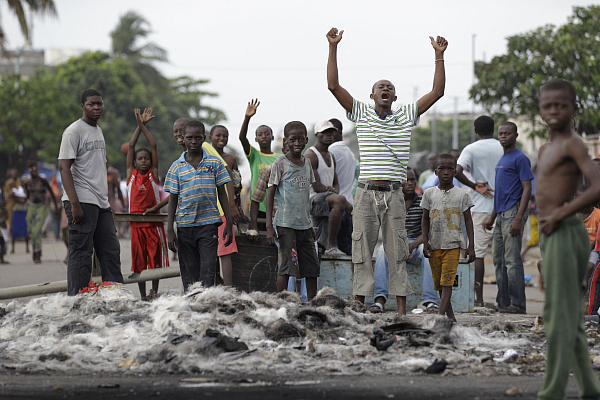
Several days after the official deadline for the results had expired, the Independent Electoral Commission for Ivory Coast claimed Ouattara as the winner with 54% of the votes. The country’s Constitutional Council, however, declared that the commission had no right to publish the results, having missed the deadline to do so. The President of the Council, Paul Yao N’Dre, also said they had decided to nullify around 500,000 votes coming from pro-opposition areas in the north of the country, alleging that the violence and tension that occurred there during the election invalidated the results. They therefore gave a marginal victory to Ggagbo, with a slim 51% of the votes. Both candidates claim they have been sworn into office. The U.N., along with most of the international community, has sided with Ouattara, and imposed sanctions on the Government, calling Ggagbo to step down. Ouattara is known to have strong connections with the West: he studied economics in the U.S. and worked with the International Monetary Fund as an analyst.
The struggle for democracy, unleashed indirectly in Egypt by the leaking of thousands of secret documents from the U.S. Diplomatic service, is particularly complicated due to Egypt’s political situation in the Middle East. The necessary succession of the Mubarak regime results in a very fragile state of affairs, as the important players in area, Israel and the U.S. on one hand, and Palestine, Syria and Iran on the other, all know how important it is to count the future Egyptian president as an ally. Precisely because of this, in a 2007 cable 07CAIRO1417 the U.S. ambassador in Cairo says that “Presidential succession is the elephant in the room of Egyptian politics. Despite incessant whispered discussions, no one in Egypt has any certainty about who will succeed Mubarak, or how the succession will happen”.
As of now, Egypt is entering its third week of paralysis; protests and riots are still widespread across the country and without a sign of relent. President Mubarak has hidden himself and even though he has come out to assure the nation that he will not run for President again, the government’s stance on the matter indicates that he does not want to step down from his office, but rather that he prefers to stall and see if the situation calms down. To relieve some tension he shifted power toward Omar Suleiman, the vice-president and the strong arm currently in charge of running the country. This political maneuver is revealing after taking into account the strategic interest from Egypt’s allies, Israel and the U.S. It is obvious that even though the Obama administration has publicly asked Mubarak to step down and allow a democratic transition, they did this knowing that they could never permit a figure such as Amre Moussa’s, the secretary of the Arab League, to lead the country.
 Time for a Cablegate farewell to interim PM Mohamed Ghannouchi. The revolution wanted Ghannouchi gone the moment he stepped into power. His ties to the Ben Ali regime could not be overcome.
Time for a Cablegate farewell to interim PM Mohamed Ghannouchi. The revolution wanted Ghannouchi gone the moment he stepped into power. His ties to the Ben Ali regime could not be overcome.
Tunisian youths were allegedly throwing rocks breaking windows right after the resignation speech. Reuters reports security forces "fired tear gas and rounds in the air to disperse them. There was no sign of any wounded."
Ghannouchi was one official the US State Department thought might succeed Ben Ali if he ever became fatally ill. This is how Ghannouchi was described in a January 9, 2006 cable titled, "Succession In Tunisia: Finding A Successor Or Feet First?":
Prime Minister Ghannouchi: (8/18/1941) A career technocrat and trained economist, Ghannouchi has served as Prime Minister since 1999. Ghannouchi is rumored to have told many that he wishes to leave the GOT but has not had the opportunity. The length of his service as PM also suggests that Ben Ali does not view him as a threat and that he is unlikely to be viewed as a qualified successor. However, average Tunisians generally view him with respect and he is well-liked in comparison to other GOT and RCD officials.
Average Tunisians' attitudes (whatever that demographic is to US officials) appear to have been made insignificant by the revolutionary organizers who continue to move Tunisia closer to the society they envision.
Over the last decade, the Colombian government has tried hard to free itself from the bonds between government officials, congressmen and military leaders and right wing paramilitary United Self-Defense Forces of Colombia. The group is sponsored by a wide range of people: from high profile corporations and politicians to small landowners looking to protect their interests from opposite guerrilla formations such as FARC (Fuerzas Armadas Revolucionarias de Colombia) and ELN (Ejercito de Liberacion Nacional). Their actual political and economic power is a matter of concern and in the past even ex-President Alvaro Uribe has been questioned about his and his government’s involvement in illegal activities related to the organization. During these years violence has been widespread and thousands of people –civilians, businessmen and politicians have been killed or kidnapped.

 Libya’s deputy foreign minister, Khaled Khaim, has reportedly told European Union ambassadors in Tripoli that al-Qaeda has set up an Islamic emirate in Derna in Eastern Libya. He allegedly said a former Guantanamo Bay detainee is heading the emirate. Residents in Derna deny this has happened.
Libya’s deputy foreign minister, Khaled Khaim, has reportedly told European Union ambassadors in Tripoli that al-Qaeda has set up an Islamic emirate in Derna in Eastern Libya. He allegedly said a former Guantanamo Bay detainee is heading the emirate. Residents in Derna deny this has happened.
Residents in Derna deny this has happened. Al Jazeera posted this exclusive with the "man accused by the Libyan government of leading an Islamist emirate in Derna, Libya." Abdul Hakeem Al Hasadi said reports of an "emirate" were the result of pure propaganda and said the Gaddafi is circulating this propaganda because he is a former political prisoner:
"I am, Abdul Hakeem Al Hasadi, a Libyan citizen and a former political prisoner. I would like to read the following statement in response to lies made by Dictator Gaddafi and his propaganda machine. I tell them that I am one of the participants in the revolution of Feb 17th along with the youth and people of Derna against the corrupt regime of Gaddafi.
"Gaddafi is trying to divide the people of the nation. He claims that there is an Islamist Emirate in Derna and that I am its Emir. He is taking advantage from the fact that I am a former political prisoner."
Despite the fact that this may not be true, prepare for this latest report from a Libyan official to become a self-perpetuating thread in the story of the Libyan revolution. As WL Central waits for more information on whether this Islamic emirate has been established or not, let's consider what Saif al-Islam Gaddafi and Leader Muammar Gaddafi have said since the uprising began (and the various WikiLeaks cables from Libya which we have available).
Spanish Special Prosecutor for Corruption and Organized Crime Jose “Pepe” Grinda Gonzalez, in charge of the prosecution of Zahkar Kalashov, a "vor v zakone" (highest echelon in Russian Mafia or Eurasian mafia leadership), recently gave a detailed assessment of Spain’s operations against Russian Organized Crime (OC) in a closed door meeting with experts on the subject, where he explained he considers Belarus, Chechnya and Russia to be virtual “mafia states” and Ukraine a soon-to-be-one (10MADRID154).
Grinda also quoted a “thesis” by Alexander Litvinenko that he believes is accurate. Litvinenko, a former Russian intelligence official who worked on OC issues, died mysteriously in London from poisoning by radioactive polonium-210 in late 2006. He believed that “the Russian Security Service (FSB), the Foreign Intelligence Service (SVR), and its military intelligence (GRU) – control OC in Russia”.
The cable also mentions Grinda saying that “he believes the FSB is “absorbing” the Russian mafia but they can also “eliminate” them in two ways: by killing OC leaders who do not do what the security services want them to do or by putting them behind bars to eliminate them as a competitor for influence. The crimelords can also be put in jail for their own protection.”
Julian Assange has lost the case at the extradition hearing. Full ruling here in PDF. While this writer expected considerable difficulty for Assange's case on count 4, Chief Magistrate Howard Riddle found all four counts to be extraditable. More on that and his findings for another day.
An important first point is that this extradition finding should not be misinterpreted as some species of proven guilt. Julian Assange is still presumed innocent until proven guilty by a proper trial process. The extradition process and appeals to follow in the UK are not that trial process.
The European Arrest Warrant system is flawed and has again been used by a signatory nation to the Framework Decision 2001 (PDF) without having to prove the strength of the prosecution case.
The young United States had barely thrown off it's own colonial shackles when in 1805 it flexed its nascent imperial powers against what is now Libya. U.S. Marines captured the Eastern Libyan city of Darnah, raise the U.S. flag over it and forced the ruler in Tripoli to sign a commercial treaty with the U.S. before withdrawing. Since those days, wherever US Marines fight and kill, from Vietnam to Afghanistan, they proudly remember those early battles to put down the Barbary pirates and insure favorable trade relations "on the shores of Tripoli."
Robbed of piracy as an income source the three areas which make up present day Libya, Tripolitania, Fezzan, and Cyrenaica, fell back under the control of the Ottoman Empire which had pretty much ran things there since the middle of the 16th century anyway. Libya rotted as a backwater of "the sick man of Europe" until Italy invaded and united the three areas as its colony in 1911. When Italy lost WWII, it lost its colony. It became the Independent and United Kingdom of Libya in 1951.
It stayed a kingdom until 1969 when a 27 year old army captain Muammar Gaddafi led a military coup d'état, installed himself as dictator and promoted himself to colonel. Military power put Gaddfi in control and he has always shown a keen interest in increasing it plus he has the petrol dollars to buy lots. This has long made him a most favored customer of the international arms industry.
El Fiscal de la Fiscalía Especial contra la Corrupción y la Criminalidad Organizada Jose “Pepe” Grinda González, que trabajo en el proceso de Zahkar Kalashov, un vor v zakone -el rango más alto en la jerarquía de la mafia rusa-, presentó recientemente un detallado análisis de las operaciones del Gobierno Español en contra del Crimen Organizado ruso (CO) o mafia Eurasiatica en una reunión a puerta cerrada con expertos en el tema, en donde explica que considera a Rusia, Bielorrusia y Chechenia como “estados-mafia”, y señala que Ucrania sigue el mismo camino. Cable:10MADRID154.
Grinda también cita notablemente la tesis mantenida por Alexander Litvinenko, el ex agente de los servicios de inteligencia rusos, que trabajaba en temas relacionados con el CO y que murió envenenado en Londres por polonio-210 radioactivo en 2006. Litvinenko sostenía que “el Servicio de Seguridad Ruso (FSB), el Servicio de Inteligencia Extranjero (SVR) y el GRU (servicio ruso inteligencia militar) – controlan el crimen organizado en Rusia”.
El cable también menciona a Grinda diciendo que “cree que el SSR está “absorbiendo” la mafia Rusa, pero que también puede ‘eliminarla’ de dos maneras: matando a los líderes de la mafia que no hacen lo que los servicios de seguridad les piden, o encerrándolos para eliminarlos de la competición por influencia. Los jefes podrían también ser encarcelados para su propia protección”. Argumenta, además, que el “Partido Democrático Liberal (PDL) fue creado por la KGB – el viejo comité para las seguridad del estado, fuerza a la que pertenecía Vladimir Putin – y que contiene muchos criminales de gran escala. Grinda añade que existen lazos comprobados entre los partidos políticos rusos, el crimen organizado y el tráfico de armas. Sin elaborar demasiado, cita el enigmático caso del "Barco del Océano Ártico” como un “claro ejemplo de tráfico de armas”.
Aside from its own political and ideological conflicts, in 2004 Pakistan saw itself obligated to join a task force with the U.S. to fight Taliban and Al-Qaeda groups in its northern region. This created a relationship of mutual interests between the Pakistani political elite and U.S. military interests on the region - generally characterized by the hunt for Osama bin Laden and other terrorist leaders. This agreement seemed to complicate problems that already existed in Pakistan, mostly corruption in every sense, and a reliance on U.S. support also was originated. Based on leaked cables of U.S. Diplomacy, we selected some cases where this co-dependence shows its weaknesses and incapabilities to establish an honest and democratic Pakistan.
U.S. DRONE ATTACKS
Current time and date in Wisconsin:
 Wisconsin? Yes, Wisconsin... WL Central has been covering all the protests worldwide. WL Central has been looking at countries regardless of whether there are WikiLeaks cables handy. And at 5:44 PM, hundreds if not more than a thousand people are in the capitol about to be removed by police.
Wisconsin? Yes, Wisconsin... WL Central has been covering all the protests worldwide. WL Central has been looking at countries regardless of whether there are WikiLeaks cables handy. And at 5:44 PM, hundreds if not more than a thousand people are in the capitol about to be removed by police.
Many of the people in Wisconsin are inspired by Egypt just like many others in the Middle East and North Africa have been moved to act. And, actually, it's not entirely true that there is nothing out there to color what is happening in Wisconsin, to illuminate the anti-worker anti-union politics that has been spreading throughout the states. If one looks at the following cable 06MEXICO2220, one can infer that the US government views workers that try to wield political power and unions which wage battles against governments as players that could threaten a country's economic stability.
In this cable, ten economic challenges that the next president of Mexico will face are outlined. One of them is "Taking On the Unions without Shutting Down the Country":
12. (SBU) Few major reform proposals will move forward without
some confrontation or deal with the unions representing the
affected industries. Unions gained power and influence over many
decades of working closely with the PRI, delivering votes in
exchange for unaffordable benefits for workers and untold riches
for union leaders. Due to union protections, for example, the
state-owned Mexico City electric utility (LyFC) has what is in
effect its own construction and manufacturing subsidiaries with
some 10,000 employees. LyFC retirees not only retire at full
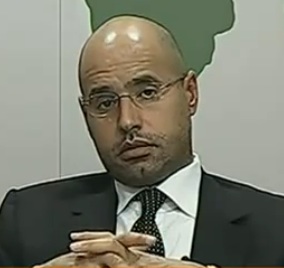 An address from Muammar al-Gaddafi’s son, Saif al-Islam al-Gaddafi, was aired on television in Libya early on February 21. Saif al-Islam told Libyans he had come without a prepared speech and was going to speak from his heart and mind.
An address from Muammar al-Gaddafi’s son, Saif al-Islam al-Gaddafi, was aired on television in Libya early on February 21. Saif al-Islam told Libyans he had come without a prepared speech and was going to speak from his heart and mind.
The address (which you can read here) was given as Tripoli was turning into more of a battlefield. Snipers were firing in Saha Al Khadra. His father’s “thugs” were allegedly going into hospitals and killing Libyans who had been out in the streets and been wounded.
Rumors are circulating that Saif al-Islam was shot. Some of the unconfirmed reports say Saif al-Islam is dead and his father and some from the Gaddafi family has fled. Muammar has gone to Venezuela, some reports allege.
The death of Saif al-Islam is possible, but until there are reports which go beyond unconfirmed, this is largely a distracting story. What Saif al-Islam said in the recorded address that aired on February 20 is much more important.
Saif's Address to Libya

The third episode of this weekly podcast, which looks at stories related to WikiLeaks from the past week, featured guest Michael K. Busch, who teaches international relations at the City College of New York, where he is also program coordinator at the Colin Powell Center for Policy Studies. He has posted on blogs on released cables on WikiBlogged, and he is listed as a resource in the back of Greg Mitchell's recently published book, "Age of WikiLeaks," which you can purchase in print on Blurb.com or in e-book form off of Amazon. [Follow him on Twitter @michaelkbusch]
The program for this week's show was dedicated to protests and violence in the Middle East and North Africa (MENA). The show will provide updates on what is happening in the region and discuss some released WikiLeaks cables that provide context for what is happening.
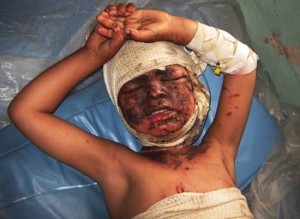 The Norwegian newspaper Aftenposten has published an article on NATO, US, and the Red Cross and the Bala Baluk massacre on May 4, 2009. The article features a cable that shows the Red Cross put together a report that raised significant doubt about military reports on the number of civilians killed. The cable reveals how a PR campaign kicked into gear to sell the idea that the deaths were not intentional and to skew coverage of the event to fit the interests of NATO and US forces in Afghanistan.
The Norwegian newspaper Aftenposten has published an article on NATO, US, and the Red Cross and the Bala Baluk massacre on May 4, 2009. The article features a cable that shows the Red Cross put together a report that raised significant doubt about military reports on the number of civilians killed. The cable reveals how a PR campaign kicked into gear to sell the idea that the deaths were not intentional and to skew coverage of the event to fit the interests of NATO and US forces in Afghanistan.
Muammar al-Gaddafi came to power in Libya on the 1st of September 1969 through a military coup which proclaimed the Libyan Arab Republic. Now he is the longest serving national leader that does not belong to a royal family. His stance on international affairs has mostly been conflictive and aggressive in nature, although after a long list of disputes, such as financing terrorism worldwide or military clashes with the U.S., he moderated his policies seeking collaboration with international corporations, especially with the Bush Administration.
In the early years of his regime Gadaffi set up a system based on what he called Islamic socialism. In practice this meant a system based on popular or direct democracy, where the population would be organized in communes or popular councils so as to personally elect their leaders. The state was built upon these units and controlled the larger companies, leaving the small ones for private ownership. In 1975 he started publishing a recollection of his philosophy in what he named the "Green Book", where he called the system in Libya the Third International Theory, a third way in between capitalism and communism. He also called his form of government Jamahiriya (a term coined by him), often translated as “republic of the masses”, thus officially making Libya the Great Socialist People's Libyan Arab Jamahiriya. After some years Gaddafi stepped down from his leading position in the General Peoples Committee (the ruling governmental organ) and is now considered a spiritual guide under the title of “Brotherly Leader and Guide of the Revolution".
A recent cable, from 2010, announces: “Jordan continues to face some of the most troubling challenges of King Abdullah's 10-year reign.¨ These problems are a deficit of USD 1.43 billion, unstable regional politics, originated from the continuous privilege of rural communities in the East Bank over urban communities with larger Palestinian populations, rigged elections and unequal political rights (09AMMAN813). The cables also reveal that this inequality is created by the government and pushed through by force: “The King's economic and political changes face domestic opposition from tribal leaders and an array of entrenched East Bank interests. The latter include many in the military, security services, and bureaucracy, who enjoy a disproportionate share of the current system”. (10AMMAN329).
According Amman News, Secretary General of the Popular Unity Party Saeed Dhiyab stated that “the clashes were instigated by a group of hooligans, and charged that security forces condoned the violence by not intervening to break out the fights”. The current unrest in Jordan seems to be -once again-, the response of the population towards a whole history of repression and injustice practiced by its government. The clashes started on the 18th of February in the capital, Amman, between protestors calling for political and economic reform, and a group for "Loyalty and Belonging" to King Abdullah II. The clash produced an unconfirmed number of victims. Foreign journalists reported violent threats to confiscate their cameras and the media is still gagged by the government.
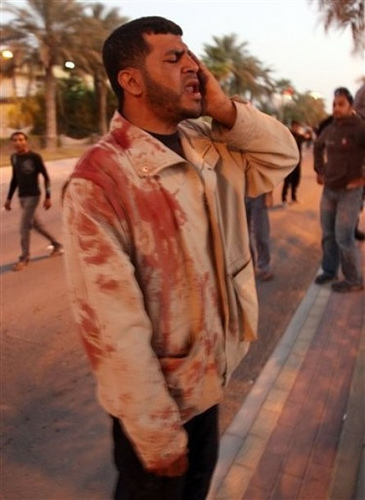 The streets of Bahrain are becoming increasingly violent. Security forces are using live rounds on protesters. Just over a day ago, right before dawn security forces ambushed protesters camping peacefully in the Pearl Roundabout, an area they had turned into their “Tahrir Square.” Many were injured, a few were killed. And, the world is witnessing the brutal discriminatory practices often used by the regime against Shia citizens and activists who dare to criticize the regime or exercise freedom of expression.
The streets of Bahrain are becoming increasingly violent. Security forces are using live rounds on protesters. Just over a day ago, right before dawn security forces ambushed protesters camping peacefully in the Pearl Roundabout, an area they had turned into their “Tahrir Square.” Many were injured, a few were killed. And, the world is witnessing the brutal discriminatory practices often used by the regime against Shia citizens and activists who dare to criticize the regime or exercise freedom of expression.
For years, a monarchy headed by King Hamad bin Isa al- Khalifa has come under sharp criticism for its use of torture. Amnesty International published a report on February 11 titled, “Crackdown in Bahrain: Human Rights at the Crossroads.” And now, WikiLeaks has released several cables detailing the torture of political prisoners and other Bahrainis.
Two days ahead of calls to protest the Gaddafi regime in a “Day of Rage” on February 17, members of the Committee of the Families of the Victims of the Abu Salim Massacre came out to protest. Libyan attorney and human rights activist Fathi Terbil, who represents families that had family members massacred in mass prison killings that took place at the Abu Salim prison in 1996, was arrested. Terbil’s arrest led to an eruption of protests ahead of the planned “Day of Rage.”
Protesters showed up to the police headquarters in the city of Benghazi to demand his release. The crowd outside swelled to somewhere between one and two thousand. This response demonstrated how the Gaddafi’s refusal to prosecute those responsible for the massacre of nearly 1200 prisoners in over a decade ago has created a deep resentment among Libyans toward the regime.
The arrest was an example of how the Gaddafi regime treats “regime critics” or dissidents.
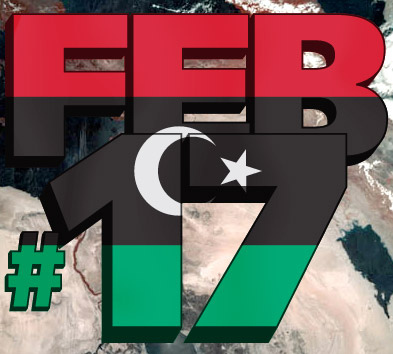 *Author's note: Previously, it had been mentioned that a Part 2 of a feature story titled "WikiLeaks Vindicates Those Behind Unfolding Revolutions" would run before the week was over. Publication has been postponed so proper coverage of cables and news related to Yemen, Algeria, Libya, Bahrain, Iran, Iraq, etc can be focused on instead.
*Author's note: Previously, it had been mentioned that a Part 2 of a feature story titled "WikiLeaks Vindicates Those Behind Unfolding Revolutions" would run before the week was over. Publication has been postponed so proper coverage of cables and news related to Yemen, Algeria, Libya, Bahrain, Iran, Iraq, etc can be focused on instead.
Libyans are mobilizing for a “Day of Rage” today on February 17. Protesters in the early afternoon, according to a member of the Libyan Youth Movement, were reported to be moving to the Security Headquarters in Benghazi. The protests are said to be gaining numbers and are headed for Maydan al Shajara once more, a location that had been the site of gunfire and petrol bombs.
The same individual also reports shortages of medical supplies at Al Bayda hospital and urges international health organizations to help out. And the movement member shared reports of people in Benghazi managed to chase away “pro-government Gaddafi thugs” by throwing rocks at them.
Many in Libya believe ahead of the “Day of Rage” that the Gaddafi regime was planning to threaten Libyans with live fire and the targeting of family members if they participated in anti-government protests. Also, it was reported that Gaddafi was having government employees go protest at pro-Gaddafi rallies, and, if they refused, they would be fired.
Cables released on Libya provide context for the protests that are unfolding. 09TRIPOLI192 from February 2009 titled, “For Ordinary Libyans, It’s the Economy Stupid,” breaks down what might be frustrating Libyans and why Egypt may have been just what they needed to be inspired to take action. The cable suggests Libyans are more interested in economic democracy, not political democracy:
A Forum entitled ‘WikiLeaks, Revolutionary Media or a Threat to Nation States’ opened in South Korea on January 6th, hosted by an NGO ‘Institute for Public Media’ discussing various issues including what WikiLeaks means to South Korea and the world, current state of freedom of expression and the right to know in South Korea, and the future of all of them.
Pending ‘Korean Fox News Effect’ and the age of WikiLeaks
“What would have happened if the cablegate coverage had first leaked by the New York Times?” The forum started with the interesting question asked by Choi Jinbong, a professor in Texas University and one of public participants of the forum. “Then it might have not been possible for the U.S. government to criminalize the Times under the Espionage Act,” he assumed. Choi pointed out the fact that “although it’s clear that what WikiLeaks does are standard works of a general media organization”, 68% of the U.S. citizens replied in the Washington Post-ABC News poll(http://wapo.st/eR9dfO) that its works are against public interest. He attributed this ‘strange bias’ to the media effects of the Fox News, and remarked on how the Fox News framed the leaks as causes of damage to the U.S. diplomacy, which led to the negative public view toward WikiLeaks.
Theme by Danetsoft and Danang Probo Sayekti inspired by Maksimer